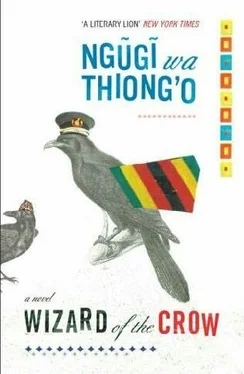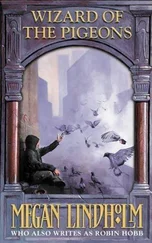His need to see Nyawlra was by now bottomless; he had been away far too long. He recalled that even Machokali had told him that he was needed only for a day and would be returned home the very first day after he had administered his cure. Maybe the Ruler had recovered, become well; maybe he was still talking. Whatever the case, it was clear that his services were no longer needed. He had to go back to Aburlria. Luckily he still had his passport and plane ticket.
But he did not want to leave just like that, without telling anybody. So he walked to the reception desk and asked for a piece of paper. He would leave a note for Machokali. But as he bent down to write, a succession of images blurred his vision. First, a bloated Mighty Excellency. The image transformed itself into that of the pregnant woman, and then into the three men from the Global Bank. Now he saw Furyk and the delegates proceeding before the big mirror in the sick chamber. Again the Wizard of the Crow recalled how the Ruler had glared at Machokali, a glare vivid for its ferocity. His body tingled with anxiety, and he felt immense pity for Machokali. The Wizard of the Crow was quite clear as to what that look and the Ruler’s shake of his head from side to side signified; but he also knew that nobody, not even Machokali, would believe him were he to put it down on paper. Still, as he bore no person any ill will, he felt it his duty to warn Machokali, without being explicit, of the danger that faced the minister.
He wrote: I have no pass. Take care of yourself. The country is pregnant. What it will give birth to, nobody knows.
He looked over the note, folded it, addressed it to Machokali, and handed it to the receptionist.
Then he hailed a yellow cab and headed for the airport to catch a flight, any flight, to Aburfria, anticipating a reunion with Nyawlra.
At that very moment, Machokali was still in his room, depressed, weighed down by fatigue, defeat, and indecision. What was he to do about the Ruler’s relapse? The Wizard of the Crow had mysteriously disappeared without a trace. How dare he defy authority?
The word authority led him to recall what the Bank officials had said: there are people going about the country calling for a resumption of queuing. He recalled that just before the women did the shameful deed at Eldares, the Ruler and the cabinet had authorized the five riders. They never called them off. What was going on?
The phone rang and he picked it up. Just trying my luck. For seven days nobody has been picking up the phone, said the receptionist. Machokali was about to tell her to mind her own business but changed his mind. Even anger feeds on energy, and his was now in short supply. Minister Sikiokuu was calling from Aburfria! There were no preliminaries. Sikiokuu simply wanted to know if the Wizard of the Crow had arrived in America. Machokali told him yes, he had arrived, but just now they did not know his whereabouts. I just wanted to confirm, Sikiokuu said quickly, and put down the receiver without explaining his own need to check on the wizard.
Why this belated concern with the arrival of the Wizard of the Crow? Why now, when the man had disappeared? The telephone conversation removed any doubts Machokali may have had about the connection between Sikiokuu and the mysterious disappearance of the Wizard of the Crow. He noted that Sikiokuu did not ask about anything else-the status of the loan, the day of their return, or even the Ruler’s condition. No, there was something dangerous afoot, and he was not about to keep his suspicions to himself.
He left his room, not noticing that A.C. stood outside the door. He went back to the sick chamber and found the others as he had left them: in various and desperate positions of prostrations, completely exhausted by the torrential seven days’ verbiage. Machokali dragged himself to where the Ruler sat, his mouth wide open and his head slumped to one side, a lifeless deity. Machokali felt it his duty to tell the Ruler his suspicions about what was happening in Aburiria, whether he understood or not. He put his mouth close to the left ear of the Ruler and whispered. Many governments in Africa, Asia, and South America had been overthrown while the Ruler was out of the country. The renewed call for queues was a plot for a coup d’etat in the making.
The words had an immediate effect on the Ruler: he straightened up. And what are you all doing lying about on the ground instead of packing? We have to go, he said, turning to Machokali as if assigning him the responsibility for ensuring that everybody and everything was ready for their departure to Aburiria to counter threats posed by the queuing and husband bashing.
“It was sad, very sad, because it looked as if they had all forgotten about the Wizard of the Crow,” A.G. was later to say in his narration of the visit. “But not me-oh, no, not me. True! Haki ya Mungu. I tried every which way I could to see the Ruler to tell him about the mysterious disappearance of the Wizard of the Crow, but it was difficult to get a private audience with him because most of the time he was surrounded by sycophants, each wanting to show that he alone knew how to take care of the needs of the Ruler.
“Once I did manage to steal a moment with him alone, but when I broached the subject of the Wizard of the Crow I saw that the Ruler did not seem to know what I was talking about. He took it that I was talking about witchcraft, bewitchment, and news from home. He told me, There you have spoken some truth, because those fellows who are queuing and the women who are beating men must be under the influence of cunning wizards. But these queuers and man beaters don’t know who they are dealing with; I will teach them a lesson they will never forget. He tried to scratch his stomach as if to remove an itch, but his hand could not reach it. Then he turned to me and told me to forget witchcraft for the time being, to go and do like everybody else: get ready to leave America. Wonders as yet unseen awaited, he said, twisting his lips into an enigmatic smile; to me it was as if he was holding something back, trying, with difficulty, to prevent himself from laughing in triumph at what he contemplated. It was a smile of suppressed anger, and, to be honest, I could not tell what had made him angrier: his bodily self-inflation, the Global Bank, the reported return of the queuing mania, or this business of women beating up men. True! Haki ya Mungu! I did not like that twisted smile one bit. And what were these wonders as yet unseen that he claimed awaited us? But I was soon caught up in the complexities of our imminent departure.”
How would they move the Buler from his hotel room? How would they get him through the doors? And what about getting him to the airport? Piles of money from the Aburirian treasury, paid to a company, the hotel, and the airline, facilitated solutions and confidentiality about the operation they code-named Hotexit.
A relieved Machokali stopped at the reception desk to make sure that everything was fine. The receptionist handed him a neatly folded piece of paper. “This has been lying in your box for more than seven days,” the receptionist told him. Machokali was about to ask him how he knew this, but then he decided against it. He was feeling good at the success of Hotexit, and why should he let the chatter of a nosy receptionist get under his skin? This is old news, he told himself, and he was about to throw the piece of paper into a garbage can without opening it when he changed his mind and put it inside the inner pocket of his jacket as he rushed to the waiting limo and on to the airport.
Arrangements were made for two planes: a jumbo jet with seats reconfigured for the Ruler, his security team, personal physician, biographer, and one or two ministers, and a smaller one for the rest of the delegation.
Читать дальше












